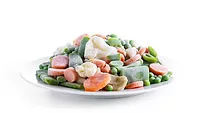A Quarter of Cooks Cause Cross-Contamination Whether They Wash Chicken or Not

Credit: Urbazon/E+ via Getty Images
A recent study has shed new light on the issue of consumers washing their poultry before cooking it. NC State University researchers, with the support of the U.S. Department of Agriculture Food Safety and Inspection Service (FSIS), found that roughly a quarter of home cooks who were observed while cooking chicken thighs and a salad had contaminated the salads with bacteria from the chicken, regardless of whether or not they had washed the chicken prior to cooking it.
In the past, FSIS has urged consumers not to wash their poultry before cooking it because water used to wash the chicken can contaminate the sink and surrounding surfaces. The aim of the study was to discover what effect education would have on consumers who wash their poultry prior to cooking it, what effect any change in behavior resulting from educational efforts would have on contamination reduction, and whether or not washing poultry would increase contamination in the kitchen.
The study observed 300 home cooks who self-reported having a habit of washing their chicken before cooking it. The control group of 158 participants did not receive any educational intervention prior to the observational study, while the treatment group of 142 participants received safety information via email with instructions warning against washing poultry. The participants were then brought to a test kitchen, where they were directed to cook chicken thighs and prepare a salad.
Researchers observed that 93 percent of the treatment group did not wash their chicken prior to cooking it, as instructed in the educational material they were provided. Only 39 percent of the uneducated control group refrained from washing the chicken. Both groups were provided with chicken that was contaminated with a harmless, traceable strain of bacteria, and both groups ended up having similar levels of contamination in the kitchen. For chicken washers, 26 and 30 percent of the prepared salad was contaminated for the control and treatment groups, respectively; for those who did not wash the chicken, 31 and 15 percent of the salad was contaminated for the control and treatment groups, respectively. In addition to the salad lettuce, researchers also found high levels of the traced bacteria in the sinks, and relatively little contamination on the nearby counters.
The researchers suspect hand-facilitated cross-contamination to be the cause of bacterial contamination in the kitchen sinks and salads. The results of the study suggest that educational intervention is effective in convincing consumers not to wash chicken prior to cooking it. The study also demonstrates the need to shift the emphasis of public education from not washing poultry to ensuring thorough hand washing and surface sanitization habits.
Looking for quick answers on food safety topics?
Try Ask FSM, our new smart AI search tool.
Ask FSM →








